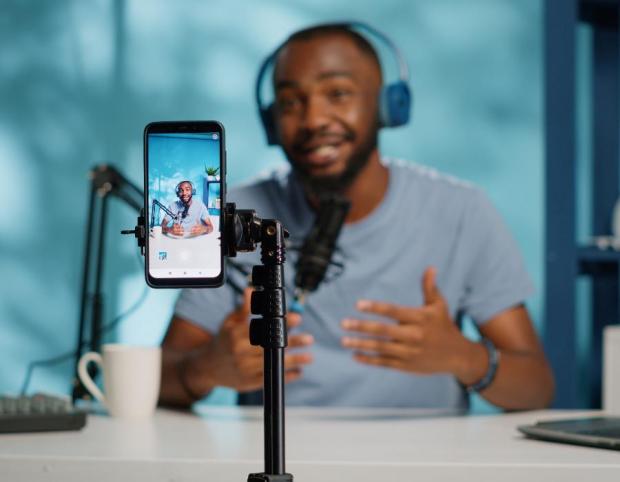It would be an understatement to claim that the esports industry is thriving. Record viewership and revenue reveal the growing power of competitive gaming, which has found a sizable audience of diehard fans.
Insights from the Consumer Technology Association (CTA) suggest strong growth in this arena, even if esports remains an "amorphous term that encompasses people who actively play video games competitively as well as an increasing audience who watch the tournament players via YouTube, Twitch or other online sources."
This growth is exciting, but it presents distinct challenges for esports teams, athletes, and influencers. The biggest challenge in the esports industry is the ability to stand out in an increasingly saturated market. Below, we will reveal how branding can play into this effort while also boosting engagement among the target audiences.
Developing a Strong Brand Identity in Esports Marketing
Brand awareness plays a critical role in the competitive esports space. Distinguishing an esports brand is crucial because there are so many titles, teams, and tournaments for busy enthusiasts to keep straight.
Strong branding can differentiate teams and athletes, thereby encouraging fans to connect with the names and personalities they find most compelling. from a sponsorship standpoint, op sponsors are more likely to work with brands whose core values are clearly conveyed and consistently integrated into consumer outreach.
Key Demographics of Esports Enthusiasts
There is no one specific type of person who qualifies as an esports enthusiast. These passionate individuals come from all walks of life and join forces to create a wonderfully inclusive and welcoming community.
Still, this space tends to skew young. CTA data reveals that approximately one-third of esports fans are between 16 and 24 years old, while nearly one-third occupy the 25 to 34-year-old age bracket. The relatively youthful nature of this pursuit must be considered when determining which personas will resonate most with engaged fans.
Importance of a Cohesive Brand Image
A cohesive brand image brings distinct visual identities to esports organizations, signaling key offerings and values while helping fans feel intrinsically connected. A clear visual identity also helps build trust. Consistency in branding fosters authenticity, which today's young consumers highly value.
Case Studies of Successful Sports Branding
A number of influencers, teams, and even leagues have successfully developed cohesive brand identities that their core fans or followers find compelling. Examples include:
- Cloud9. As a familiar name even among esports novices, Cloud9 has played a powerful role in shaping the overarching esports landscape. Its branding centers around a simple yet effective cloud shape. Its presence is not at all flashy; it feels welcoming and consistent with its commitment to expanding the scope of esports.
- Fnatic. All around the world, esports fans recognize the bright orange branding associated with the brand name Fnatic. Boasting a powerful legacy as an esports trailblazer, Fnatic has long demonstrated the importance of branding. Its messaging reflects a strong legacy but also highlights the value of fan engagement by adopting a player-centric approach.
- Faker. As a renowned League of Legends player, Faker boasts a massive fan base. Although his appeal largely stems from his exceptional skill, he also possesses a strong personal brand. He interacts extensively with his fans, maintaining a relatable image that many find appealing.
Digital Marketing Strategies for Esports

The digital realm forms the basis of esports marketing, in which traditional methods associated with classic sports may not always be relevant or effective. Social media and streaming are clear priorities, although content marketing, search engine optimization, and even email blasts may have a role to play in shaping the esports environment of tomorrow.
Leveraging Social Media Platforms
Social media forms the basis of several successful esports marketing initiatives, providing an intuitive space in which fans and athletes, influencers, or streamers can interact. Most teams or players focus primarily on one or two platforms that align best with their brand image or goals. Consistent updates are essential, and these should always be purpose-driven rather than sounding overly "salesy."
Content Marketing Essentials for Engagement
Content marketing offers an exciting chance to demonstrate authority as an esports expert while also helping novice fans get familiar with the intricacies of esports. Content marketing can take many forms, ranging from video content to blogs. As with social media posts, these should drive clear value for readers or viewers.
Sponsorships and Partnerships in Esports Marketing
Sponsors and partners represent a critical source of revenue in esports, where earnings are less likely to center around ticket sales or even merchandise. Top sponsors may support entire teams or focus on specific players or events. Others work closely with streamers or other content creators.
By working with top esports entities, these sponsors hope to achieve greater brand recognition. Some sponsorships could be as simple as in-stream promotions or social media posts, but some sponsors may even secure naming rights.
Finding the Right Partners for Your Brand
While cash-strapped esports athletes or teams might clamor for any available sponsors, it’s far more important to choose a suitable partner. Sponsorships need to feel authentic to the brand, or they risk turning away otherwise committed fans. Thoroughly vetting potential sponsors to determine their core values and whether they align with the team or player in question is best practice.
Maximizing the Benefits of Sponsorships
Sponsorships must be actively managed and optimized. By managing your partnership, you can ensure that the sponsorship and core branding efforts feel cohesive. Options for maximizing sponsorship advantages include:
- Offer various tiers of sponsorship or other tailored packages to meet individual sponsor needs.
- Develop long-term relationships rather than continually seeking out one-off deals.
- Provide detailed insights into metrics to help sponsors understand the ROI of key partnerships.
Community Engagement and Fan Loyalty
Esports marketing is all about engagement. The goal here is to fire up fans and help them develop a passionate and closely connected community. Engagement is achieved not only by establishing a presence on social media and streaming platforms but also by making fans feel seen and appreciated.
Creating a Community Around Your Brand
Community-building begins with understanding who feels drawn to specific esports brands and how these fans or followers prefer to interact. Building a community will make it easier to engage with fans in a way they find compelling. It can be advantageous to create a central hub to help fans navigate various offerings on streaming platforms or social media.
Strategies to Increase Fan Engagement
Once the initial steps of community-building have been established, creative strategies can take fan engagement to a whole new level. Some fans favor behind-the-scenes content, which lends an air of exclusivity.
Challenges or contests can be exciting and may encourage fans to share their unique talents. Some esports brands also boost engagement by offering special perks for their most loyal fans. Perks could include merch discounts or even early access to much-anticipated content.
Innovative Marketing Techniques in Esports
Esports marketing should be dynamic, engaging, and innovative, just like the industry itself. While some elements of classic marketing will always be relevant, cutting-edge techniques can greatly appeal to forward-thinking fans, as highlighted below:
Utilizing Influencers and Streamers

Influencer marketing is a significant force in the esports space, building authentic connections with fans while producing a wealth of content that is always exciting to consume. The most effective marketing campaigns make full use of these influencers and streamers, who can build wonderfully authentic connections and inspire goodwill for specific teams or athletes.
Virtual Events and Their Impact on Brand Visibility
Virtual events bring top esports brands to the forefront. Not only do brands benefit from acting as major sponsors, but they also stand to gain if players actively use their products. Consumers will be more inclined to opt for brands they know from events they've seen, especially if top esports athletes regularly utilize those products.
Measuring Success in Esports Marketing
Esports marketing initiatives should not feel haphazard. Upon establishing goals and strategies, analysis should remain a priority to ensure that campaigns deliver a strong return on investment.
Key Performance Indicators (KPIs) for Esports Brands
Key performance indicators (KPIs) verify whether esports marketing strategies make a splash. Examples of KPIs worth tracking include:
- Social media engagement. Followers are important, but in esports, social media is often a function of quantity versus quality. Ideally, followers will be fully engaged, with a high percentage actively commenting on or sharing content. Sentiment analysis can reveal how fans perceive individual players or sponsors.
- Event metrics. Are esports tournaments and other vital events well-attended by fans? Live streams can produce powerful insights with viewership numbers, revealing who watches and when.
- Return on investment. Smaller esports teams may have limited marketing resources, so a strong ROI is essential. ROI can be verified by determining the cost per acquisition (CPA) for each additional fan, along with financial returns from various sponsors.
Tools and Platforms for Analytics and Tracking
While the process of tracking and analyzing metrics can feel time-consuming or downright confusing, a wealth of advanced tools promises to help. Insights are often directly available from social media, while Google Analytics can provide helpful insights on general web performance. Many teams rely on dedicated analytics software or platforms, such as Stream Hatchet or HubSpot.
Improve Your Sports Branding With an Esports Management Degree
Are you passionate about esports and eager to explore the exciting business side of this growing industry? Look to Champlain College Online to help you make a splash in this unique field. Available online, our Bachelor of Science in eSports Management provides a deep dive into the thrilling world of eSports, including the field's many marketing and branding opportunities. Contact us to learn more.
FAQs
Compared to traditional sports marketing, esports campaigns place a greater emphasis on sponsorships and partnerships, which can help make up for comparatively minimal ticket sales or in-venue purchases. Marketing efforts must be aligned not only with the core brand identity of the team in question but also with values highlighted by various sponsors or partners.
Small esports teams can set themselves up for marketing success by identifying their vision and values, along with key qualities that set their fans apart. A unique logo is a must, along with the consistent use of team colors. Other essential steps involve establishing an online presence, typically by building a website, posting updates on TikTok, and getting involved with platforms such as Twitch.
Virtual and augmented reality (VR and AR) are expected to play a more prominent role in the esports space, including immersive marketing strategies. Some examples of incorporating VR/AR could include virtual meet-and-greet experiences or even entire events held exclusively in a VR space. AI and machine learning may also be more notable in the future. These evolving technologies can help promote advanced data analytics, offering real-time insights and boosting marketing ROI.
Download Program Guide
Learn what you can expect from our online bachelor's in eSports Management program.

Download Program Guide
I acknowledge that, by clicking the "submit" button, I am giving my express written consent to Champlain College and its representatives to contact me about educational opportunities via email, text, or phone, at the phone number above, including my mobile phone, using an automatic dialer, or pre-recorded message. Message and data rates may apply. I understand that my consent is not a requirement for enrollment, and I may withdraw my consent at any time.






